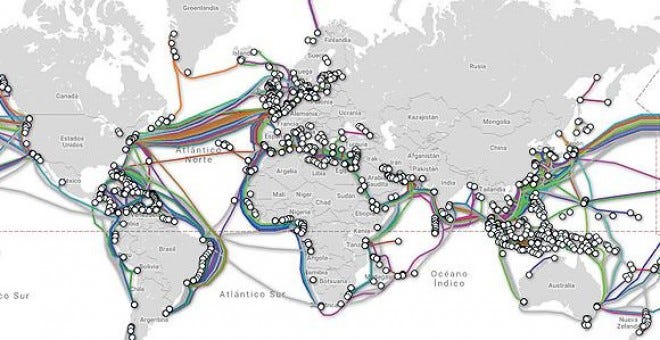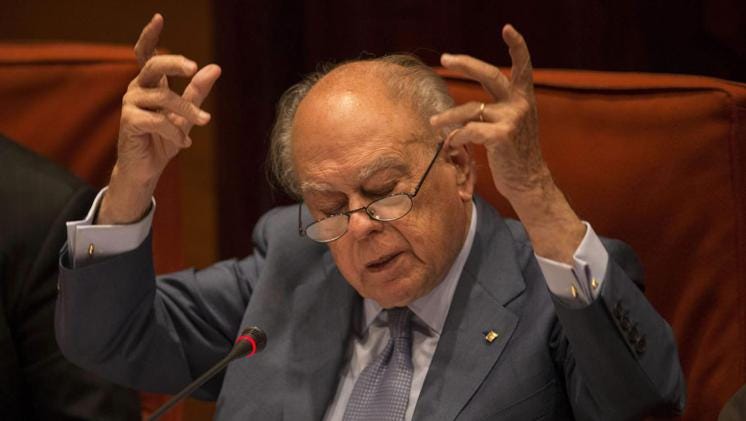Experiments in fiction and reality: Catalan Separatists and Reckless Meme Necromancers
The working definition of "meme" is somewhat dry, and less innovative than it might seem. Although the term was coined by Richard Dawkins, the notion that ideas are subject to evolutionary pressures is much older, dating back to the origins of evolutionary theory itself. As zoologist and philosopher Thomas Henry Huxley (nicknamed “Darwin’s bulldog”) asserted in 1880: “The struggle for existence holds as much in the intellectual as in the physical world. A theory is a species of thinking, and its right to exist is coextensive with its power of resisting extinction by its rivals”.
Huxley correctly identified that the mechanisms responsible for evolution (variation, reproduction and selection) operated also on ideas and other cultural artifacts. Although accepting of this hypothetical mechanism, he was agnostic on its capacity to generate new species. Speciation through natural selection could not be proven without empirical demonstration. In zoology, this would mean exposing two lines of animals to different conditions, letting them evolve their separate ways until they’re unable to generate infertile progeny when mixed.
In his famous futuristic novel Brave New World, Thomas Henry's grandson Aldous Huxley presented a Humanity divided into different bio-socio-cultural classes. These classes range from smart and handsome Alphas, destined to be managers of a global society; to semi-moronic, hideous Epsilon menial workers. In the novel, all human reproduction happens as State-sponsored in vitro cloning, so there’s no real evolutionary process going on: fetuses are subject to different processes which lead to their differentiation. Can Alphas and Epsilons have children? We can assume they do, given they all come from the same ovary. In any case, Genetics is given a clearly utilitarian approach in Brave New World. The biochemical, material processes the fetuses endure are the root cause of their conformity and a key to the Humanity's global culture.
The interest Memetics has ignited in the Intelligence Community is similarly utilitarian. This interest stems from the notion that memetic evolution heavily influences human behavior. But is it really the cause of it, or a symptom? Marx and Engels argue that productive relations are the real base over which super-structures such as culture can be built. In the Preface to A Contribution to the Critique of Political Economy, they even go as afar as to argue that “The mode of production of material life conditions the general process of social, political and intellectual life”. Are memes a cultural construction that emanates from the physical? This would form the basis for a materialist analysis of memes, a possibility pointed at in a fascinating article published recently at Fragmentos Maquínicos.
Without claiming that the material forms the base for everything, it is obvious that there is some deep relation between the evolutionary success of a meme and its material origin. Memes, even online ones, require physical support. Directly, through the Internet's backbone, the miles and miles of underwater cable that still carry forth most communication between computers.
Secondly, because the host of the meme inhabits the physical world and is conditioned by his material circumstances. Memes native to industrialized societies have better chances for reproduction, because they run on the their society's cultural industry's distribution network. This is one of the reasons Western and Japanese folklore are better known world-wide than, say, their Bedouin or Mongolian equivalents. Similarly, a meme requiring a specific cultural milieu will be mostly restricted to a population primed for it through education and media; lacking this priming, the meme will adapt to better suit its host, or disappear. An illustrative example of this process are the mutations experienced by socialist memes when they entered post-Enlightenment Germany, a matter which was already discussed elsewhere in this blog.
Lemurian Time War is a theory-fiction analysis written by the Cybernetic Culture Research Unit (Ccru). A shining example of accelerationist literature, it questions the notion of a linear, sequential timeline, introducing the concept of hyperstition. Hyperstitions are fictions that make themselves real: memes which are able to trascend into the material. Hyperstitions bring forth the possibility of time being recursive, because they imply a fracture in the categorical separation of fiction and reality. Fiction and reality become extremes of a continuum, a spectrum of the degrees of realization of an entity. Like in a metabolic chain reaction, fiction determines perception, and perception determines behavioral and affective responses, which lead to the actualization of the meme into reality. Consequently, if fictions are capable of weaving reality, then their invocation is an act of magic: the circulation of specific signs designed to alter the material world. Hyperstitional memes are not passive repositories of cultural code, but agents of transformation.
A mass experiment in hyperstitional meme magic was recently performed on the population of the Spanish North-Eastern region of Catalonia. Although its historical roots can be traced much further, the modern Catalan nationalist movement was born in the 1970s, after the death of Generalissimo Franco and the restoration of Constitutional Monarchy. Much of its success can be traced to a single man, Jordi Pujol, an anti-Francoist and Catalanist activist who founded the party Convergència Democràtica de Catalunya (Democratic Convergence of Catalonia, CDC).
Pujol had studied Medicine in the prestigious University of Barcelona and worked for a pharmaceutical company. A charismatic man of deep Catholic and Catalanist convictions, he quickly became a key figure of right-wing regionalism. Following some successful political manoeuvering in the early years of Spanish democracy, in 1980 he rose to President of the Catalan regional government, the Generalitat, and stayed in power until 2003.
Pujol’s role as power broker and kingmaker for the successive central Spanish Governments in Madrid enabled him to push his own agenda, centered around building the “Catalan national conscience”. For decades, a narrative of “democratic” Catalonia’s victimization by “regressive” Spain was pushed from the media and from schools, unchallenged. Wide competencies were transferred from the Spanish Government to the Generalitat in the departments of Education, Health and Justice. Well-connected Catalan nationalists were set on the fast track for careers in education and culture. Spanish military and police presence was replaced by a regional police force with loyal higher cadres. Commercial offices working as faux-embassies were opened all over the world with public resources.
Language, the code for conceptual memes, was key to the Nationalist project. The promotion of the local Catalan tongue was thus a cornerstone Catalanism, and successive laws were passed to enforce its usage. It became mandatory in schools, and fines for businesses which labeled only in Spanish were introduced.
Interestingly, immigration from Morocco was promoted to stifle the effect of the Spanish-fluent one arriving from Latin America; Arab-speaking Moroccans were supposedly easier to integrate de novo into the Catalan new nation. The deals with Morocco included the Generalitat hiring a Moroccan agent, Noureddine Ziani, for the promotion of Catalanism. Ziani operated in the Catalan high spheres for 14 years, until his expulsion by the Spanish Secret services, accused of fostering Muslim radicalism. Whether the charges were true or not, Catalonia remains not only a hub of Muslim immigration to Spain, but also the capital of European jihadism.
The Catalan nation-building projects were possible because Pujol was owed favors by everyone in the Spanish political establishment. Seen as a sort of Pater patriae, he was beloved by Catalans and made pacts with virtually everybody in Madrid, using the increasing centrifugal tendencies of Catalonia as leverage. His massive corruption schemes involved actors of all political colors; rumor has it, they splashed everyone up to King Juan Carlos I.
As it usually happens with corruption, no one complained while there was something to gain from it. After the financial crisis of 2008, however, things started going South for Catalanists. Impopular economic policies had to be enacted. The rampant corruption of Pujol's CDC party was coming to light. Power struggles with other nationalist factions had become ruthless. On a bid for regaining popularity and diverting attention away from corruption, CDC started tightening the pressure on the Spanish Government, demanding more sovereignty. An explicitly Separatist movement, supposedly grassroots, took over the streets, engulfing the Generalitat in a purity spiral of Catalanism.
The Separatist propaganda machine had been set in full motion to spread the message of Spanish oppression of Catalonia, ironically one of the richest and most influential regions of the country. Mass produced memes were flowing out of schools, radios and televisions. A radical activist, Carles Puigdemont, was elected President of the Generalitat. After some years of massive rallies and the complete polarization and degradation of Catalan political life, the Independence process culminated in an illegal referendum on October 1st, 2017. Only Separatists believed the referendum to be legitimate, and since there was no official register of voters, the result was overwhelmingly favorable to Independence.
Obviously, this referendum was understood as a direct attack to the State, so Spanish Police were deployed to stop it. Confronting huge walls of voters, the Police resorted to beating their way towards the ballot boxes to confiscate them. The resulting images were exactly what Separatist politicians had hoped for: a symbol of Spanish “fascist” tendencies. They had memed Spanish repression into reality.
The memetic sphere was ripe for independence. There was an Oppressive Regime™, a beaten down People™ thirsting for freedom, and a Historic Moment™. Two days after the referendum, Separatists gathered to witness their President Carles Puigdemont declaring Independence. He did, and then awkwardly backed off a few seconds later, ruling over the shortest Republic in History. Nobody recognized the new country, and the movement was completely demoralized. Catalan Separatism is still recovering from the disappointment, not fully awaken from the spell.
Two non-exclusive theories can explain what happened on 2017: (1) the Separatists were abandoned by their international backers, and (2) Separatists were simply victims of a backfiring memetic spell. Perhaps the Separatists secretly expected the Spanish government to send in armored divisions instead of police, filling the streets with corpses and inspiring international sympathy and action. Since none of that happened, after their botched attempt, leaders of the coup either fled Spain like criminals, or faced prison sentences.
The following court hearings revealed that, despite their lush spending in propaganda both at home and abroad, the Generalitat hadn't really prepared for the possibility of success: all culprits claimed the Declaration had been “a symbolic act”. Maybe they were tricked by their foreign partners, or maybe they didn't really believe they would get so far with their bluffing, and were pushed into a headlong flight. Or maybe they thought that, if the invocations were sufficiently powerful, a Hyperstitional Catalan Republic would simply materialize by way of Historic Necessity. Meme magic is a tempting, but dangerous practice, and the practitioner has to be very careful, lest he risk falling prey to the demons he has conjured.










